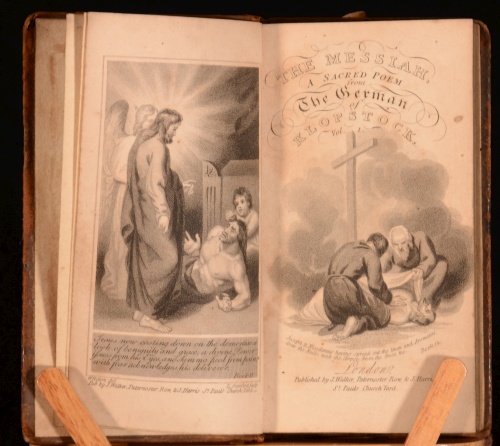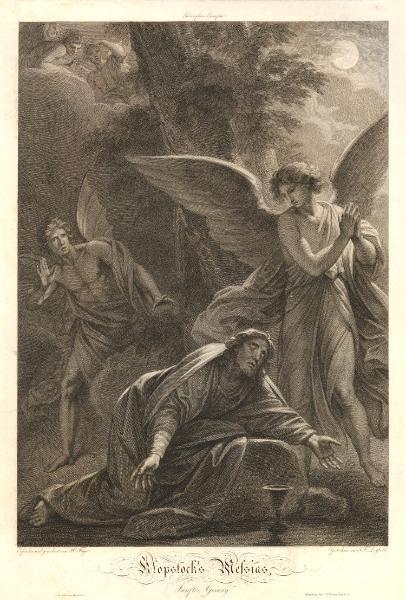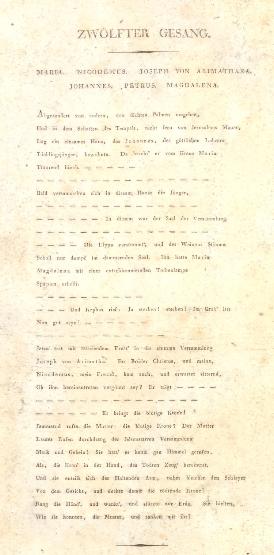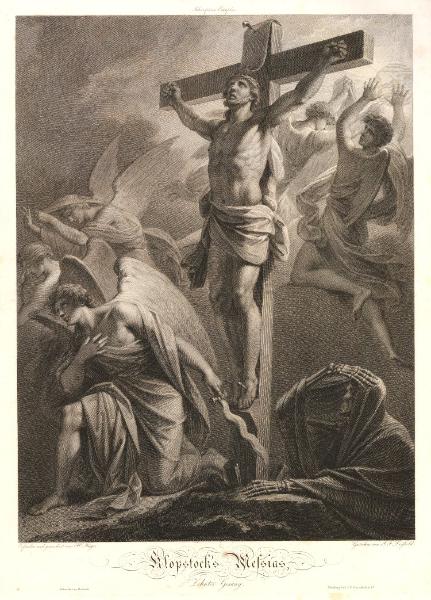| Friedrich Gottlieb Klopstock |
| KLOPSTOCK, Friedrich Gottlieb, a German poet, born in Quedlinburg, July 2, 1724, died in Hamburg, March 14, 1803. He was born in a small house at the foot of the castle hill in the Schlossplatz, recognizable by the two pillars which support its porch. His father was a public functionary in comfortable circumstances and his mother a woman of great piety. In 1740 he entered the seminary of Schulpforte. At that early age he was already possessed by the ambition of producing a great epic. The stirring incidents of the life of Henry the Fowler captivated for a time his imagination, as shown by some odes written by him in honor of that prince; but after his attendance at the university of Jena (1745), religious enthusiasm led to the conception of his Messias (“Messiah”). In 1746 he went to Leipsic, then the resort of many literary men, who, after their secession from the pedantic school of Gottsched, had formed in 1740 a poetical union and established an independent literary journal published in Bremen. Klopstock, in his ode entitled Wingolf, distinguishes Gellert, Rabener, Hagedorn, Gleim, and many others of his literary associates of Leipsic, who as early as 1747 had recognized him as able to inaugurate a new era in German poetry. The first three cantos of his “Messiah” were published in 1748, in the Bremen Literarische Zeitung, and the poem was eventually regarded as equal to the epics of Dante and Milton, especially by the religious and female portion of the community. Gottsched, however, ridiculed what he called Klopstock's “seraphic spirit of fanaticism;” and his strictures on his dogmatism, his effeminate and morbid tenderness, and his religious sentimentality were afterward confirmed by Lessing, although in a milder and more dignified spirit. Foremost among his admirers was Bodmer of Zürich, the opponent of Gottsched, the translator of Milton, and the head of a school of poets and religionists. From 1748 to 1750 Klopstock was employed as a teacher in the family of his relative Weiss in Langensalza, where he met the sister of his friend Schmidt, whom he celebrates in his odes as his beloved Fanny, but who did not reciprocate his affection. In the summer of 1750 he went with his friend Sulzer to Zürich, which he left in the following year, in compliance with an invitation from the Danish prime minister Bernstorff, who offered him a pension of $300, in order to enable him to devote himself exclusively to the completion of his epic. On his way to Copenhagen he fell in love with Margaretha (Meta) Moller, the daughter of a Hamburg merchant, whom he celebrates under the name of Cidli. In the Danish capital he was received with marked distinction, and introduced to the king, whom he accompanied on a journey to Holstein, on which occasion he spent some time with Meta, who became his wife in 1754. She died in 1758, in her 31st year. The loveliness of her character is apparent in her correspondence with Richardson, the English novelist, with Cramer, an intimate friend of Klopstock, and with her husband. (See “Memoirs of Frederick and Margaret Klopstock,” English translation, by Elizabeth Smith, London, 1808; and her correspondence with Richardson, 1818.) Klopstock resided now alternately in Brunswick, Quedlinburg, and Blankenburg, till 1763, when he returned to Copenhagen. In 1771, on Bernstorff's withdrawal from the ministry, he went to Hamburg with the rank of a councillor of the Danish legation. In 1792 he contracted a second marriage with Johanna Elisabeth von Dimpfel, whose first husband had been a nobleman named Windhem. He lived in Hamburg until his death, occasionally visiting literary friends in various parts of Germany. A pension was conferred upon him by the prince of Baden, and honorary citizenship by the French revolutionists. His death was looked upon in Germany as a national calamity, and his funeral was celebrated with the pomp and solemnity generally accorded only to royal personages. — The last two volumes of his "Messiah" and the greater portion of his odes appeared from 1769 to 1773. He wrote various grammatical and philological works and sacred dramas, or rather dramatic poems, chiefly turning upon characters of the Old Testament, as “The Death of Adam,” “Solomon,” and “David;” also several patriotic dramas (Bardiete), in commemoration of the national hero Hermann. Klopstock's works resemble translations from some unknown poet, prepared by a skilful but unpoetical philologist. Goethe remarked in his conversations with Eckermann that German literature was greatly indebted to Klopstock, who was in advance of his times, but that the times had since advanced beyond Klopstock. Goethe in his autobiography also records his personal impression of Klopstock: “He was of small stature, but well built. His manners were grave and decorous, but free from pedantry. His address was intelligent and pleasing. On the whole, one might have taken him for a diplomatist. He carried himself with the self-conscious dignity of a person who has a great moral mission to fulfil. He conversed with facility on various subjects, but rather avoided speaking of poetry and literary matters.” His works have gone through many editions. Among the English translations of the “Messiah” is one into prose by Mrs. and Mr. Collyer, and a metrical translation appeared in London in 1825-'6. The “Death of Adam” and “Solomon” have also been translated into English, as well as his “Odes,” the latter by W. Nind (London, 1848). — See also Miss Benger, “Klopstock and his Friends” (London, 1814); Mörikofer, Klopstock in Zürich (Zürich, 1851); and a French essay on him by Dietz (Paris, 1859). D. F. Strauss has an essay on Klopstock in his Kleine Schriften (Berlin, 1866). |

| The Messiah From the German of Klopstock |

| Left: Moonlit scene with Christ kneeling on the floor in the foreground; Angel standing to right; devil in the background to left |
| Klopstocks Morgengesang am Schöpfungsfeste ~ Carl Philipp Emanuel Bach |

| Klopstock's Messias (Klopstock's 'Messiah') / Zwölfter Gesang (Canto 12) |


| Left: Klopstock's Messias (Klopstock's 'Messiah') Zehnter Gesang (Canto 10) |